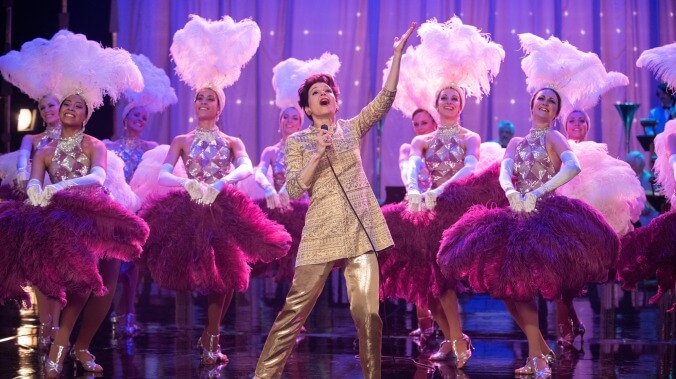Renée Zellweger zings in a Judy Garland biopic that clangs

Judy Garland reinvented herself dozens of times in her 47 years of life. The child vaudevillian. The teenage girl next door. The MGM musical star. The brassy concert performer. The Oscar contender. The boozy TV host. The troubled Hollywood cautionary tale. In a 1968 interview on The Dick Cavett Show, Garland joked, “I’m getting tired of coming back. I really am. I can’t even go to… the powder room without making a comeback.” Unlike the 2001 ABC miniseries Life With Judy Garland: Me And My Shadows, which traced her birth-to-death narrative, Rupert Goold’s Judy attempts to sum up Garland’s complex life by looking largely at her waning days, during a last-ditch comeback that turned out to be a farewell. It’s an intriguing idea that results in a painfully by-the-books biopic. That being said, a gusty, heartbreaking turn from Renée Zellweger makes the exercise worth sitting through.
Part of the appeal of watching Zellweger tackle the role is that she herself seems poised on the brink of a career comeback. She ended a six-year acting hiatus with 2016’s Bridget Jones’s Baby, and Judy is an even more triumphant announcement of her return, one that will almost certainly be in the awards-season conversation. Despite some uncannily great makeup and hair design, Zellweger never entirely disappears into the role, extending Judy’s story into a meta reflection of every Hollywood actress crushed by megalomaniac studio heads and the endless demands of a mercurial public. Zellweger’s Judy is a fascinating mix of frailty and flintiness, part baby bird that’s fallen out of the nest and part vaudevillian so steeped in the art of working a crowd that she couldn’t stop if she tried.
Loosely based on Peter Quilter’s critically acclaimed play End Of The Rainbow, Judy centers on a five-week run of London concerts Garland did in 1968, not long before she died. It was a desperate time for the erstwhile Dorothy Gale, who was buried under mountains of debt and locked in a custody battle over her two young children with her third husband/former manager Sidney Luft (Rufus Sewell). When we first meet Zellweger’s Judy, she can still sell out theaters, but she’s effectively homeless. So she packs up her things and does what she’s been doing since she was just 2 years old: sing for her supper—and the supper of everyone around her.
Screenwriter Tom Edge ratchets up the sense of anticipation by waiting quite a while before we hear Judy sing; once she starts, however, the musical numbers become the lifeblood of the film. Goold’s long career as a theater director serves him well in staging Judy’s concert performances, which include “By Myself,” “The Trolley Song” (which scores a montage of work, pills, and insomnia), “Come Rain Or Come Shine,” and, of course, “Somewhere Over The Rainbow.” A lifelong show pony, Judy can instantly snap out of a prescription drug-fueled haze into full-on star mode—except when she can’t and her performances crash and burn, which is gripping in a different kind of way. Zellweger provides her own vocals, and gives the performances an uninhibited live-wire quality that’s more powerful than a direct impression ever could be. She sounds fantastic, which makes her a fine fit for a past-her-prime version of one of the greatest singers in American history.
Less effective are flashbacks to the early days of Judy’s MGM career, just before starring in The Wizard Of Oz. They’re meant to add depth to Judy’s present-day struggles, but they indulge in the worst biopic clichés and fail to bring them to life with any sense of conviction. The villainous figures who robbed Judy of a childhood are cartoonish rather than terrifying, and Darci Shaw’s younger version of Judy feels more like a metaphor for innocence than an actual human being. Biopic clichés abound in the 1968 portion as well, as Judy falls for a dreamy younger man (Finn Wittrock) and alternately earns the ire and sympathy of her minder (Wild Rose’s Jessie Buckley). But those segments are at least buoyed by Zellweger’s performance, and at their best locate some genuine humanity behind their more maudlin aims—like a sweet (if overly sentimental) sequence where Judy befriends a pair of gay fans who come to see her night after night.
Though it tries to keep its focus relatively contained, Judy fails to find a sense of thematic cohesion, which perhaps just speaks to what a gargantuan figure Judy Garland is in American pop culture. Judy’s most poignant moments emerge when the film trusts Zellweger’s understated line readings to encapsulate big ideas, like Judy’s loving relationship with her kids or her complex co-dependency with her fans. Most heartbreaking of all is a brief, poignant acknowledgement of just how much Garland’s eventual decline came about simply because studio executives wanted her to be thinner. Unfortunately, Judy too often feels shallow and surface, even as Zellweger’s performance works overtime to give it heft and depth. Still, Garland’s life is so inherently emotional and Zellweger’s performance is so appreciably raw, that Judy manages to wring pathos by the end. It just does so without the grace that defined its central star at her best.